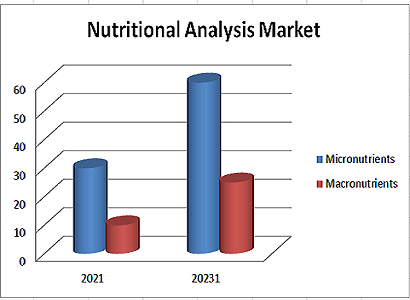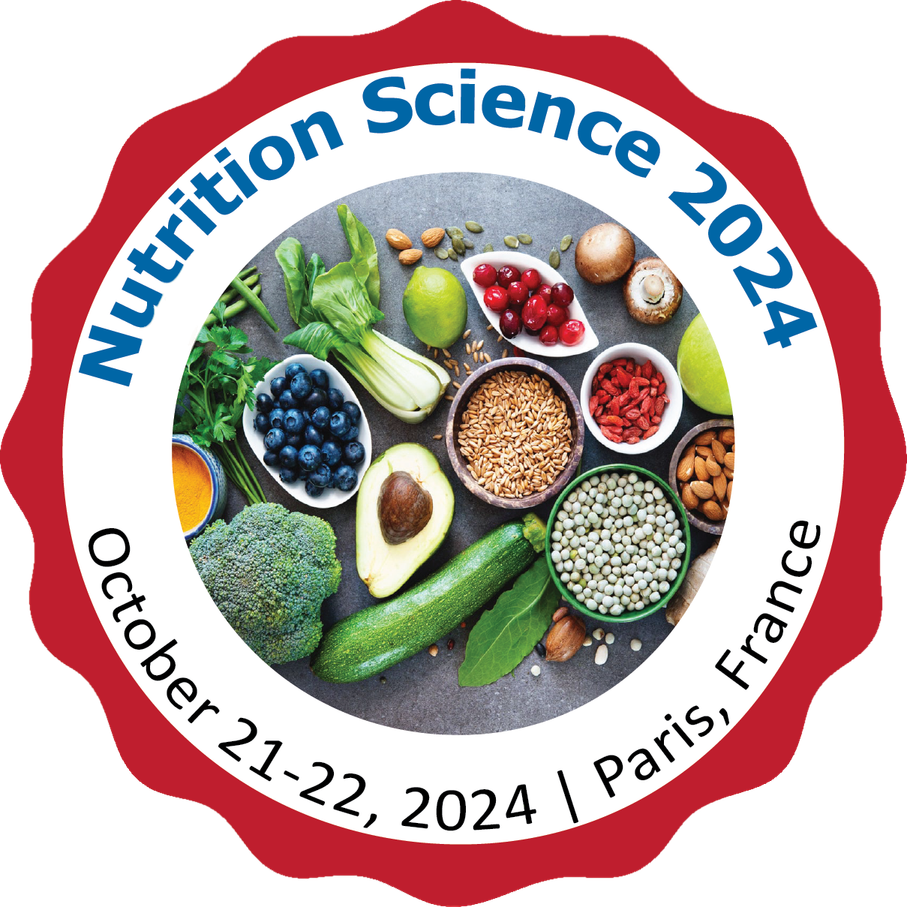Previous Speakers

Ms.Niloofar Pejman
Polytechnic University of Catalonia, Barcelona, Spain
Recommended Global Nutrition Webinars & Conferences
Asia Pacific & Middle East
Canada
Nutrition Science 2024
- About the Conference
- Nutrition
- Food Science
- Sessions & Tracks
- why to attend our conference?
- Market Analysis
- Past Conference Report
About the Conference
We are currently bringing the "28th World Congress on Nutrition and Food Sciences" (NUTRITION SCIENCE 2024) dated on October 21-22, 2024 at Paris, France. The conference invites all the participants across the globe to attend and share their insights and convey in the field of Food and Nutritional Sciences.
Conference Theme "Addressing global challenges in nutrition and food security"
The Nutrition Science 2024 is honored to host high-profile keynote speakers from around the world such as speakers(oral presentations), poster presentations, young re-searchers forum, delegates to discuss and share on Food and Nutritional Sciences.
Nutrition
Nutrition is the science and study of the interactions between living organisms and the substances they consume to obtain and maintain health. It involves the processes of ingestion, digestion, absorption, transport, assimilation and excretion of nutrients found in food. The goal of nutrition is to understand how different nutrients impact the body's functions, growth, development and maintenance.
Carbohydrates:- Main sources of energy, found in foods like grains, fruits and vegetables.
Proteins:- Essential for building and repairing tissues, found in meat, beans, dairy and nuts.
Fats:- Important for energy storage, insulation and nutrient absorption, found in oils, nuts and fatty fish.
Vitamins:- Essential for various biochemical processes. Examples include vitamin C, found in fruits and vitamin D, obtained from sunlight and certain foods.
Minerals:- Important for bone health, nerve function and more. Examples include calcium (dairy) and iron (meat and legumes).
Water:- Vital for digestion, nutrient transport, temperature regulation and waste elimination.
Dietary Fiber:- Found in fruits, vegetables and whole grains, it aids in digestion and helps prevent constipation
Food Science
Food science is a multidisciplinary field that involves the study of the physical, chemical, biological, and engineering properties of food and the application of this knowledge to the production, processing, preservation, quality assurance and distribution of food products. It combines principles from various scientific disciplines such as biology, chemistry, physics, microbiology and engineering to understand the nature of food and improve its safety, quality and nutritional value.
Food Chemistry:- Examines the composition and properties of food components, including carbohydrates, proteins, fats, vitamins, minerals and additives.
Food Microbiology:- Focuses on the study of microorganisms in food, including their role in food spoilage, preservation and foodborne illnesses.
Food Engineering:- Involves the application of engineering principles to food processing, packaging, and storage to optimize efficiency, safety and quality
Sessions & Tracks
Functional foods and nutraceuticals
Functional foods and nutraceuticals play a crucial role in promoting health and preventing diseases. These products are enriched with beneficial nutrients or compounds that provide health benefits beyond basic nutrition. Functional foods contain bioactive components such as antioxidants, probiotics and omega-3 fatty acids which can improve overall health and well-being.
Nutraceuticals are products derived from food sources with extra health benefits, including the prevention and treatment of diseases. They often contain isolated nutrients, herbal extracts, or dietary supplements, offering advantages like improved digestion, enhanced immunity and better heart health.
Consuming functional foods and nutraceuticals as part of a balanced diet can help manage various health conditions, such as obesity, diabetes and cardiovascular diseases. However, it's essential to consult with a healthcare professional before incorporating these products into your diet to ensure they are safe and suitable for your individual health needs.
Nutrition plays a pivotal role in public health, influencing the well-being of individuals and communities alike. A balanced diet, rich in essential nutrients, is crucial for maintaining optimal health and preventing a range of diseases. Public health initiatives often focus on promoting healthy eating habits and increasing access to nutritious foods to improve overall health outcomes.
Poor nutrition is a significant risk factor for various health issues, including obesity, diabetes, cardiovascular diseases, and certain cancers. Addressing these challenges requires a multifaceted approach, including education on healthy eating, policy changes to improve food environments and community-based interventions to promote healthy lifestyles.
By emphasizing the importance of nutrition in public health policies and programs, we can work towards reducing the burden of diet-related diseases and improving the overall health and well-being of populations worldwide.
Nutrition plays a crucial role in healthy aging, influencing the quality of life and overall health in older adults. As people age, their nutritional needs may change, requiring adjustments in diet to maintain optimal health and well-being.
A diet rich in fruits, vegetables, whole grains, and lean proteins can help older adults maintain a healthy weight, manage chronic conditions, and reduce the risk of developing age-related diseases such as osteoporosis, heart disease and cognitive decline. Adequate intake of nutrients like calcium, vitamin D and vitamin B12 becomes particularly important as people age, as these nutrients are essential for bone health, muscle function and cognitive function.
Additionally, staying hydrated and limiting intake of sugary drinks and high-fat foods can help older adults maintain a healthy weight and reduce the risk of developing chronic diseases. Regular physical activity is also important for maintaining muscle mass, bone density, and overall mobility as people age. By focusing on a balanced diet and healthy lifestyle, older adults can support their health and well-being as they age.
Food processing and technology
Food processing and technology play a critical role in ensuring the safety, quality, and availability of food products. These processes involve transforming raw agricultural products into consumable goods through various methods such as cleaning, sorting, cooking and packaging.
Food processing helps extend the shelf life of products, making them more accessible to consumers over long distances and periods. It also enhances the nutritional value of certain foods, such as fortifying cereals with vitamins and minerals to address deficiencies in the diet.
Technological advancements in food processing have led to innovations like pasteurization, canning, and freeze-drying, which have revolutionized the food industry. These processes not only improve food safety but also contribute to the preservation of nutrients and the development of convenient, ready-to-eat products.
However, it's essential to balance the benefits of food processing with the need to maintain the natural integrity of foods and minimize the use of additives and preservatives. By leveraging technology responsibly, we can continue to improve food safety, quality and sustainability.
Nutrition education plays a vital role in promoting healthy eating habits and influencing behaviour change. By providing individuals with information about the importance of balanced diets, nutrients, and portion sizes, nutrition education can empower people to make healthier food choices.
Behaviour change strategies, such as goal setting, self-monitoring, and social support, are often used in nutrition education programs to help individuals adopt and maintain healthy eating habits. These programs aim to modify attitudes, beliefs and behaviours related to food and nutrition, ultimately leading to improved health outcomes.
Effective nutrition education also considers cultural, social, and economic factors that influence food choices. By tailoring messages and interventions to the specific needs and preferences of the target population, nutrition education programs can be more impactful in promoting long-term behaviour change and improving overall health and well-being.
Nutritional Biochemistry and Metabolism
Nutritional biochemistry and metabolism are branches of science that study how nutrients in food are processed, stored and used in the body. These fields provide insights into how dietary choices impact health at the molecular level.
Metabolism refers to the complex biochemical processes that occur in cells to convert nutrients into energy and building blocks for growth, repair and maintenance of tissues. Understanding metabolism is crucial for managing weight, preventing diseases and optimizing athletic performance.
Nutritional biochemistry explores how nutrients interact with biological processes in the body. For example, it investigates how vitamins and minerals act as cofactors in enzymatic reactions, how proteins are broken down into amino acids for muscle synthesis and how fats are metabolized for energy production.
By studying nutritional biochemistry and metabolism, researchers can develop evidence-based dietary recommendations to support health and well-being throughout the lifespan
Food Allergies and Intolerances
Food allergies and intolerances are adverse reactions to certain foods that can cause a range of symptoms, from mild discomfort to severe reactions. Food allergies involve the immune system and can trigger symptoms such as hives, swelling, digestive issues and even life-threatening anaphylaxis. Common allergens include nuts, shellfish, eggs and dairy products.
Food intolerances, on the other hand, do not involve the immune system but rather occur due to the inability to digest certain foods properly. Symptoms of food intolerances can include bloating, gas, diarrhoea and abdominal pain. Common intolerances include lactose intolerance and gluten intolerance (celiac disease).
Managing food allergies and intolerances involves identifying trigger foods and avoiding them in the diet. For those with severe allergies, carrying an epinephrine auto-injector and having an emergency action plan is essential. Working with a healthcare provider or dietitian can help individuals navigate their dietary needs and ensure proper nutrition despite food restrictions
Nutrition and Sports Performance
Nutrition plays a crucial role in sports performance, influencing energy levels, recovery and overall athletic success.Carbohydrates are a key fuel source for athletes, providing energy for endurance activities and high-intensity exercise. Protein is essential for muscle repair and growth, making it important for athletes looking to build strength and recover from workouts.
Fat is another important energy source, especially during longer duration activities. Adequate hydration is also critical for performance, as even mild dehydration can impair athletic abilities.
Timing and composition of meals are also crucial. Eating a balanced meal containing carbohydrates, protein and fats 2-3 hours before exercise can help provide sustained energy. After exercise, consuming a meal or snack containing protein and carbohydrates can help replenish glycogen stores and support muscle repair.
Overall, a well-rounded diet rich in whole foods is key for supporting optimal sports performance and recovery.
Global food security is a complex issue that encompasses the availability, access, and utilization of food worldwide. It is influenced by various factors, including population growth, climate change, economic conditions and food distribution systems.
Ensuring global food security requires addressing these factors through sustainable agricultural practices, improved access to nutritious foods and effective food policies and programs. Sustainable agriculture practices, such as crop diversification and efficient water use, can help increase food production while minimizing environmental impact.
Improving access to food involves addressing issues of poverty, food distribution and food waste. Economic policies that support small-scale farmers and food assistance programs can help ensure that everyone has access to an adequate and nutritious diet. Additionally, education about nutrition and sustainable food practices can help improve food utilization and reduce food waste. By addressing these challenges at local, national and global levels, we can work towards achieving food security for all.
Gut microbiota composed of trillions of microorganisms residing in the gastrointestinal tract, play a crucial role in maintaining health and well-being. These microorganisms, including bacteria, viruses, fungi, and archaea, contribute to digestion, metabolism and immune function. The composition of gut microbiota can be influenced by various factors, including diet, lifestyle and environment. A balanced and diverse gut microbiota is associated with better health outcomes, while disruptions in the microbiota, known as dysbiosis have been linked to various health conditions, including obesity, inflammatory bowel disease, and depression.
Maintaining a healthy gut microbiota involves consuming a diet rich in fiber, fruits, vegetables and fermented foods, which can promote the growth of beneficial bacteria. Probiotics and prebiotics can also help support a healthy gut microbiota. By understanding the complex relationship between gut microbiota and health, researchers hope to develop new strategies for improving overall health and treating a range of diseases.
Nutrition plays a significant role in mental health, influencing mood, cognition and overall brain function. A balanced diet rich in fruits, vegetables, whole grains, lean proteins and healthy fats provides the essential nutrients needed for optimal brain health.
Certain nutrients, such as omega-3 fatty acids, B vitamins, zinc, magnesium and antioxidants, have been linked to improved mental well-being and a reduced risk of depression and anxiety. Conversely, diets high in processed foods, sugar and unhealthy fats have been associated with a higher risk of mental health disorders.
Additionally, the gut-brain axis, which connects the gut and the brain through neural, hormonal and immunological pathways, highlights the importance of gut health in mental health. A healthy gut microbiota, influenced by diet, can positively impact mood and cognition.
By emphasizing a nutritious diet and supporting gut health, individuals can potentially improve their mental health and overall well-being.
Food Safety and Quality Assurance
Food safety and quality assurance are essential aspects of the food industry, ensuring that food products are safe, wholesome and meet regulatory standards. Food safety practices involve the handling, preparation and storage of food to prevent contamination and foodborne illnesses. This includes maintaining proper hygiene, cooking food to the correct temperature and avoiding cross-contamination between raw and cooked foods.
Quality assurance, on the other hand, focuses on ensuring that food products meet the expected quality standards, including taste, texture and appearance. This involves monitoring and controlling the production process, from sourcing raw materials to packaging and distribution.
Both food safety and quality assurance are critical for protecting consumer health and maintaining trust in the food supply chain. By implementing stringent safety and quality control measures, the food industry can ensure that consumers have access to safe, high-quality food products.
Nutrition and Chronic Disease Management
Nutrition plays a crucial role in the management of chronic diseases such as diabetes, cardiovascular disease and hypertension. A well-balanced diet can help control symptoms, prevent complications and improve overall health outcomes for individuals with these conditions.
For example, individuals with diabetes can benefit from a diet rich in fiber, whole grains, fruits and vegetables, which can help regulate blood sugar levels. Similarly, a diet low in saturated fats and cholesterol can help manage cholesterol levels and reduce the risk of heart disease.
Nutrition can also play a role in managing conditions like hypertension, where reducing sodium intake and increasing potassium-rich foods can help lower blood pressure. Overall, a healthy diet, combined with regular physical activity and medical treatment as needed, is essential for managing chronic diseases and improving quality of life.
Nutrigenomics is a field of study that explores the interaction between diet, genetics and health. It looks at how individual genetic variations can influence how people respond to nutrients in foods and how these responses can impact health and disease risk.
Personalized nutrition, based on nutrigenomics, aims to provide tailored dietary recommendations based on an individual's genetic makeup. By understanding how genes influence nutrient metabolism, absorption and utilization, personalized nutrition can help optimize health outcomes and prevent diet-related diseases.
Advancements in technology, such as genetic testing and analysis, have made personalized nutrition more accessible. Individuals can now receive personalized dietary advice based on their genetic profile, lifestyle and health goals.
While personalized nutrition holds promise for improving health outcomes, more research is needed to fully understand the complex interactions between genes, diet and health.
Food policy and advocacy play a crucial role in shaping the food system to promote health, sustainability and social justice. Food policies are regulations, laws and guidelines that influence how food is produced, processed, distributed, and consumed.
Advocacy efforts aim to influence food policies to address issues such as food insecurity, malnutrition and unsustainable food production practices. Advocates work to raise awareness, mobilize communities and engage policymakers to create positive change in the food system.
Key areas of food policy and advocacy include promoting access to healthy and affordable food, supporting sustainable agricultural practices and addressing food waste and food deserts. By advocating for policies that prioritize health, equity and sustainability, advocates can help create a food system that supports the well-being of individuals, communities and the planet.
Sustainable food systems are those that provide healthy, affordable, and culturally appropriate food while minimizing environmental impact and supporting local economies. These systems aim to balance the needs of present and future generations by promoting biodiversity, conserving natural resources and reducing waste and pollution.
Key components of sustainable food systems include sustainable agricultural practices, such as organic farming, agroecology and permaculture, which prioritize soil health, water conservation and biodiversity.
In addition to sustainable production practices, sustainable food systems also involve equitable distribution of food, ensuring that all individuals have access to nutritious and culturally appropriate food.
Consumers can contribute to sustainable food systems by supporting local and organic food producers, reducing food waste, and making environmentally conscious food choices. By promoting sustainability in food systems, we can work towards a healthier planet and a more resilient food supply for future generations.
Nutrition plays a crucial role in supporting immune function, helping the body defend against infections and diseases. Several nutrients are essential for a healthy immune system, including vitamins A, C, D, E, B6 and B12, as well as folate, iron, selenium and zinc.
Vitamin C, for example, is known for its antioxidant properties and its role in supporting the immune system's function. Vitamin D is important for regulating immune responses and reducing inflammation. Zinc is necessary for the development and function of immune cells, while iron is essential for immune cell proliferation and function.
A balanced diet that includes a variety of fruits, vegetables, whole grains, lean proteins and healthy fats can help support immune function. Additionally, maintaining a healthy lifestyle with regular exercise, adequate sleep and stress management can further support a strong immune system
Nutritional interventions in special populations
Nutritional interventions in special populations such as children, pregnant women, older adults, and individuals with specific health conditions are tailored to meet their unique dietary needs and promote optimal health outcomes.
For example, nutritional interventions for children focus on supporting growth and development through adequate intake of essential nutrients like protein, calcium, iron and vitamins A and C. Pregnant women require increased intake of nutrients such as folic acid, iron and calcium to support fetal development and prevent birth defects. Older adults may benefit from nutritional interventions that focus on maintaining muscle mass, bone density, and cognitive function. This may involve increasing protein intake, ensuring adequate vitamin D and calcium intake and promoting hydration.
Individuals with specific health conditions, such as diabetes, cardiovascular disease, or gastrointestinal disorders, may require specialized diets to manage their condition and prevent complications. Nutritional interventions in these populations are often tailored to control blood sugar levels, reduce cholesterol levels, or manage symptoms.
Overall, nutritional interventions in special populations aim to optimize health outcomes and improve quality of life through personalized dietary recommendations and support.
Emerging trends in food science and technology
Emerging trends in food science and technology are shaping the way food is produced, processed, and consumed, with a focus on sustainability, health, and convenience. One trend is the rise of plant-based and alternative proteins, driven by concerns over environmental sustainability and animal welfare. These products are becoming more accessible and appealing to consumers, offering a viable alternative to traditional animal-based proteins.
Another trend is the use of advanced technologies, such as blockchain and artificial intelligence, to enhance food safety and traceability. These technologies enable better tracking of food products from farm to fork, ensuring transparency and reducing the risk of foodborne illnesses. Functional foods, which offer additional health benefits beyond basic nutrition, are also gaining popularity. These foods are enriched with bioactive compounds, such as antioxidants and probiotics, to promote better health and well-being.
Overall, these emerging trends are revolutionizing the food industry, offering innovative solutions to meet the growing demand for sustainable, healthy and convenient food options.
why to attend our conference?
Attending a NUTRITION SCIENCE 2024 can offer numerous benefits for professionals, researchers and individuals interested in the field of nutrition. Here are several reasons why you might consider attending a nutritional conference
This conference aim is to provide latest research on Food and Nutrition and to get rid of bad diet from everyone and to share the knowledge on healthy diet, obesity and weight management and also sharing of some food security challenges during pandemic situation.
The NUTRITION SCIENCE 2024 includes advanced workshops on Food and Nutrition, lectures and symposia including a designated registration area, a refreshment break and gala lunch. So come and join leading experts and allied professionals to keep up with the rapidly accelerating pace of change that is already having an impact on the field of Food & Nutrition and will continue to in the future.
Market Analysis
The international nutritional analysis market is predictable to be USD 5.4 billion in 2021 and is anticipated to grasp USD 7.9 billion by 2026 at a CAGR of 8.3% from 2021 to 2031.
Market of food and Nutrition supplements market has seen a prodigious spike in manufacture and sales. This has empowered many new Industries to dive into the business sector with goods that pledge to be the remedy for youth, wellbeing and essentialness. As directed by the Nutritional journals the nutritional supplement market worldwide is estimated to be $104 billion.

Nutrition analysis is the progression of concentrating food while also allowing for biosynthesis, catabolism, excretion, assimilation, and absorption. Nutritional analysis guarantees that food quality is enhanced and secure. Nutritional analysis is most usually used in the retail food packaging industry in the form of nutrition fact menus and panel labeling. The nutritional makeup of foods can be discovered and measured precisely through nutritional analysis. This is significant because the nutritional composition of food is enormously essential to both consumers and authorities.
Past Conference Report
Nutrition Science 2023
27th World Congress on Nutrition and Food Sciences was held during October 16-17, 2023 at Singapore City, Singapore. With the support and contribution of the Organizing Committee Members were successfully hosted the event at the conference venue. Firstly we must thank you for trusting us and participating at Nutrition Science 2023 is a global platform to discuss various important details about Nutrition and Food Sciences
There are many reasons to extend our gratitude to you for making the Nutrition Science 2023 outstanding conference. We couldn't have done it without your continuous support and believe towards our organization which mutually made to achieve a new heights in the field of Nutrition and Food Sciences. The conference was marked with the attendance of Vitamins, Minerals, Dietary Fiber, Protein, Carbohydrates, Re-searchers, Scientists and talented student communities representing more than 30 countries who have driven this event into the path of success. The conference was organized around the theme “Bridging Excellence in Food and Nutrition”. The event implanted a firm relation of upcoming strategies in the business related field with the scientific community.
The conference proceedings were carried out through various Scientific-sessions and plenary lectures of which the following Speakers were highlighted as: The conference witnessed an amalgamation of peerless speakers, Keynote speakers, well-known International speakers and delegates who enlightened the crowd with their enviable research knowledge and on various alluring topics related to the field of Minerals, Proteins Carbohydrates, Healthy Fats, Diet Planning, Food Groups, Balanced Diet, Amino Acids. Through their fabulous presentations at the podium of Cosmetic Derma Summit. We offer its heartfelt appreciation to all the Organizing Committee Members, Chairs and Co-chairs, Speakers, Students and Editorial Board Members who supported the conference in every aspect for the awe-inspiring exhibition at the venue. We are also obliged to various delegate experts, company representatives and other eminent personalities who supported the conference by facilitating active discussion forums. We sincerely thank the Organizing Committee Members.
So, as continuation of Nutrition Science 2024 we would like to heartily invite you to 28th World Congress on Nutrition and Food Sciences in the dated of October 21-22, 2024 at Paris, France. We look forward to see your presence with active contribution and support to make this event successful once more.
Contact for more details
Program Manager | Nutrition Science 2024
Past Reports Gallery
To Collaborate Scientific Professionals around the World
Conference Date October 21-22, 2024
For Sponsors & Exhibitors
Speaker Opportunity
Useful Links
Past Conference Report
Supported By
All accepted abstracts will be published in respective Conference Series International Journals.
Abstracts will be provided with Digital Object Identifier by









